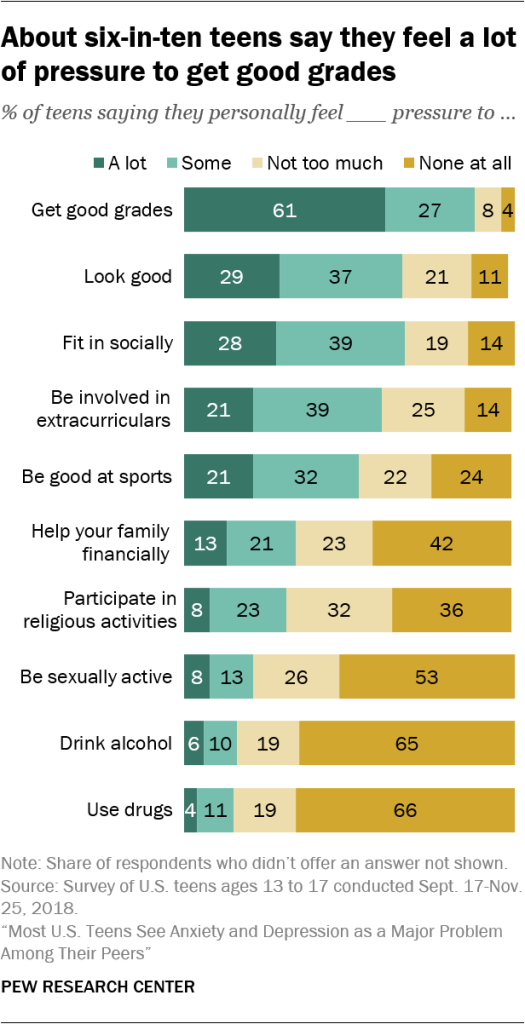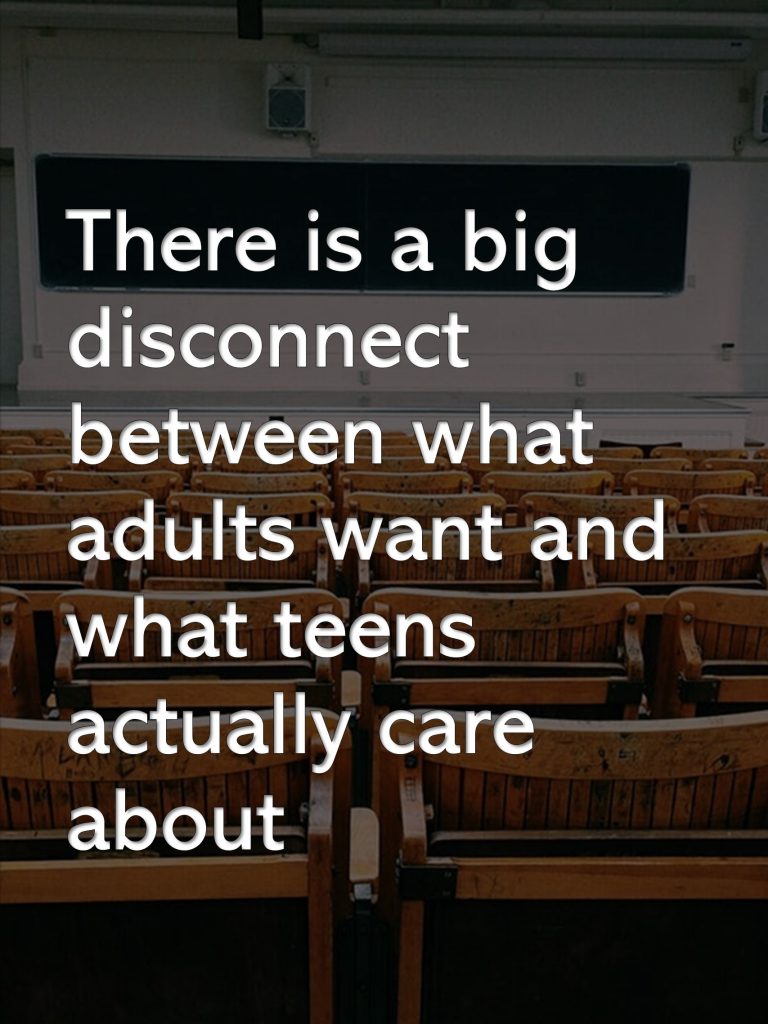What’s causing teen depression and anxiety?
Teenagers are facing a mental health crisis. This isn’t unique to one demographic, it’s happening all across the board.
The teenage years are stressful for every generation, but mental health issues are more pronounced than ever before. So, what has changed? Why is teen depression and anxiety getting worse?

In this post, we’ll explore the nature of depression and anxiety in teens today including topics such as:
- Statistics about teenage stress and depression
- Research on the factors that contribute to anxiety
- The root cause of teen stress
- Actions that parents can take today to help their children
Teen Stress Statistics
As parents and educators, we prefer to focus on the positives, but it’s important to the know the full extent of the issue at hand. Teens are stressed, and it’s getting worse. I don’t want to dwell on the statistics, but I’ve included them here to show the scope of the problem.
- Over the last 20 years, overall suicide mortality rate has increased by 33% (Hedegaard, 2018).
- Suicide is the second leading cause of death for US citizens ages 10-34 (Hedegaard, 2018).
- In 2017 suicides among teen girls hit a 40-year high (Fox, 2017)
- Over half of all child suicide attempts occur between ages 15-17 (AAP, 2017).
- Between 2010 and 2015, teen depression increased by 33% (Twenge et al., 2018).
- In the same period, teen suicide increased by 31% (Twenge et al., 2018).
- About one-third of U.S. college students had difficulty functioning in the last 12 months because of depression (Novotney, 2014)
- 70% of teens say that anxiety and depression is a “major problem” (Graf, 2019)
The reality of the situation is bleak, but the good news is the problem gets clearer every year. With more clarity, comes better solutions.
What are teens stressed about?
Researchers agree that stress factors for teens come down to a few key issues, academic performance, technology usage, and social pressure.

A recent study by the Pew Research Center surveyed teens to understand the daily factors that cause stress (Graf, 2019). These findings came from a diverse population of students ranging from different income levels and demographics. The data shows that the biggest source of stress is school—61% of teens say it causes “a lot of stress”. The next biggest factor is “[to] look good” and “[to] fit in socially.” Even though it’s in second place, less than only one-third of teens say this a lot of pressure. This means that most of the pressure comes from school.
The study continues to show that stereotypical ‘peer-pressure’ categories (like drugs, alcohol, or sexual activity) were the lowest stressors.
Since 2014, researchers at Arizona State University have been comparing mental health issues from teens of different economic backgrounds (Luthar, 2018). The research shows schoolwork has a bigger impact on mental health than financial status. In fact, students who attend high-achieving schools face the most risk for mental health issues.
The most recent publication states:
“Though these youngsters are thought of as ‘having it all’, they are statistically more likely than normative samples to show serious disturbances across several domains including drug and alcohol use, as well as internalizing and externalizing problems.”
In 2015, San Diego State and Florida State conducted a joint survey to measure factors that related to teenage mental health issues (Twenge, 2018). The study found that depression correlates to screen time and social media usage. The researchers also agree that there is little connection between depression and economic standing (unemployment, poverty, national recession, etc.)
While these studies explore the different factors that contribute to mental health issues, they don’t address the core issue. School, technology, and social pressure may seem unrelated, but they’re not. They’re symptoms of something more.
What is the root cause of teen stress?
There are many things that contribute to teen stress, but why is the problem getting worse?
Teenagers have gone to school for generations. We’ve all faced social pressures. We’ve all experienced the thrill of new technology and its addictive pull. These things may add to our stress, but they don’t cause it. The question is, why do some students get stressed about these things while others don’t?
There’s a deeper root cause behind teen stress—a fundamental issue lurking below the surface.
We, at the Leadership Society of Arizona, have worked with over 2,000 teens and 1,500 college students over the last 10 years. Every semester, we work one-on-one with over 20 students and parents in our success coaching programs. The biggest issue we have found among our students is living up to the expectations of adults.
As parents and teachers, we want the best for our kids. We want them to live happy and successful lives. We push them to do great things. But, in our effort to push them towards greatness, we often overestimate their abilities.
 There is a big disconnect between what adults want and what teens actually care about. Parents want their kids to think about the future—their careers and long-term plans. This isn’t a bad thing, but parents can see further into the future because their brain is fully-developed. They have lived through most everything a teenager could go through and much more. However, a teenager can only see what’s happening that day, week, or maybe a few months ahead.
There is a big disconnect between what adults want and what teens actually care about. Parents want their kids to think about the future—their careers and long-term plans. This isn’t a bad thing, but parents can see further into the future because their brain is fully-developed. They have lived through most everything a teenager could go through and much more. However, a teenager can only see what’s happening that day, week, or maybe a few months ahead.
Today, teens are expected to get good grades, to go to a good college, and land a high-paying career. We tell kids to treat school as if it were a job, but it’s more demanding that. School requires students to sit still for 6 hours, listen, take notes, memorize, organize, and practice self-control. Most adults can’t manage these things for a two-hour office meeting.
On top of everything, we expect our teens to take care of themselves. For some, this means staying healthy, engaged, and positive. For the less fortunate, this means supporting their family financially and taking care of the home.
As adults, this may not seem like a full schedule, but for teens, this is overwhelming. Adults forget what it’s like to be young. We forget how difficult it is to teach yourself to go to bed on time and wake up early. We forget how much time we wasted and all the stupid things we did.
We want our kids to be better than we were, but we forget to let our kids be who they are.
This is why school stresses teens—they’re worried about failure. This is why teens obsess over technology—they’re looking for an escape. This is why teens feel social pressure—they can’t stop comparing themselves to others.
How can I help my teen?
 The problem is not as bad as you think. There’s a lot that you can do to help your teen, even if they don’t seem very stressed.
The problem is not as bad as you think. There’s a lot that you can do to help your teen, even if they don’t seem very stressed.
At LSA, we offer Success Coaching to a select group of students ranging from 13 to 18. We have found that there are three easy things that you can start doing to help your teen manage his or her stress:
- Examine your expectations
- Support self-discovery
- Develop solutions together
Examining Expectations
This is easy in theory but difficult in practice. There’s no one-size-fits-all solution to reviewing expectations. It’s not always the case, but we have found that when parents have fewer and simpler expectations, students feel more confident. Some parents are strict about school, while others focus on household responsibilities. Every parent has their own brand of expectations. Here are some questions you can ask yourself to get started:
- What conversations seem to cause the most stress?
- What causes the most arguments with my child?
- What are the rules that I must continually reinforce?
- Are there any rules that I can adjust to allow for more freedom?
- Has my child been asking for more freedom in certain areas?
Let these questions be a general guide for you. Every child is different—some need more structure than others. Some might need more rules. The important thing is to always take time to reflect on how to can give more freedom.

Above all else, take time to remind your child that no mistake is too big. There’s always room to learn from their trials. Help them feel comfortable coming to you when they’ve fallen on tough times. Remind them that your relationship is more important than anything else. They might not believe you at first, but as they see your continual efforts, they’ll be more willing to work with you.
For a great resource on communicating and understanding your child, read Dr. Marshall Rosenberg’s book, Nonviolent Communication.
Support Self-Discovery
Help your child learn more about who they are and what makes them happy. This is the most important part of any education. We try to remind our students that they are always more important than curriculum. Too many students are getting degrees and pursuing jobs they hate. This is a recipe for more distress. Take time to help your teen “find themselves”.
This doesn’t need to be an abstract or spiritual experience. There are many objective ways to support self-discovery. Here are a few:
- Encourage your teen to try new things.
- Support hobbies even if they seem strange.
- Whenever your teen talks to you, treat it as a miracle.
- Talk about life, thoughts, and dreams.
- Share stories from your own life.
- Find common interests and set time aside to do them together.
- Let your teen vent. Don’t say too much in response.
These may seem like simple activities, but from our experience, they’re widely overlooked. We ask all of our students if they talk to their parents—most of them say yes, but their conversations are usually about school, chores, and work. If you help your child see that you are a supportive resource, they will eventually ask for you guidance freely.
 Develop Solutions Together
Develop Solutions Together
If your teen doesn’t have an issue with social media, then they probably have an issue with something else. Every child needs an escape, a hobby, or a way to blow off steam. We all might obsess over some of these hobbies, but there’s no cause for alarm.
When you see your teen struggling with a particular issue, start a dialog. Make them feel like they are the source of the solution. Let them accountable.
Take a positive interest in their social media or video game usage. Ask them if it ever brings them down or causes anxiety. Ask them if them if that’s something they want to change. See if they’re open to set a goal for themselves. Start small and work up. Let them uncover their root issues and create solutions. Wait for them to ask for your input.
The goal here is to turn away from expectations and turn towards mentorship and guidance.
Conclusion
 Depression and anxiety are big issues for teens. There are many factors that add to a teen’s stress, but the root is high expectations.
Depression and anxiety are big issues for teens. There are many factors that add to a teen’s stress, but the root is high expectations.
As parents and teachers, if we work to lower expectations and help teens feel more empowered about their success, we can have a major impact. Start by trying a few simple things:
- Review the rules and expectations that you enforce.
- Encourage activities to help your teen discover their passion and motivation.
- Help your teen set goals for themselves instead.
If you or someone you know is facing depression because of cyber bullying, here is a great resource.
If you enjoyed this article, and you’d like to learn more strategies to becoming a better mentor for teens, sign up to receive updates about our mentoring book coming out in January. You can also be updated of future blogs by subscribing below.
About the Author
Dr. Jake Gunnoe is an education consultant who sits on the Board of Directors at LSA.
Jake received his Master’s and PhD in management; his research efforts focus on integrating engineering and scientific processes with professional talent management and leadership development. Jake co-founded LSA with the objective of providing young students with professional success coaching to help them develop key social skills and industry-proven character traits that lead to greater success. Jake presents to groups of industry leaders offering insight on how to better engage the millennial workforce.
Sources
American Academy of Pediatrics (AAP). (2017). “Children’s hospitals admissions for suicidal thoughts, actions double during past decade”. AAP News & Journals. May 4, 2017. Link to Article
Novotney A. (2014). “Students under pressure”. American Psychology Association. September 2014. (45) (8) Link to Article
Fox, M. (2017). Suicides in Teen Girls Hit 40-Year High. NBC News. August 3, 2017. Link to Article
Twenge, J. M., Joiner, T. E., Rogers, M. L., & Martin, G. N. (2018). Increases in Depressive Symptoms, Suicide-Related Outcomes, and Suicide Rates Among U.S. Adolescents After 2010 and Links to Increased New Media Screen Time. Clinical Psychological Science, 6(1), 3–17. Link to Article
Hedegaard, H., Curtin, S., Warner, M. (2018). “Suicide Mortality in the United States, 1999–2017”, National Center for Health Statistics. November 2018. Link to Article
Luthar, Suniya & Kumar, Nina. (2018). Youth in High-Achieving Schools: Challenges to Mental Health and Directions for Evidence-Based Interventions. February 2018. Link to Article
Graf, N., Horowitz, J. (2019). “Most U.S. Teens See Anxiety and Depression as a Major Problem Among Their Peers” Pew Research Center. February 20, 2019 Link to Article

